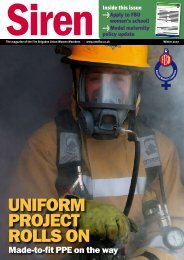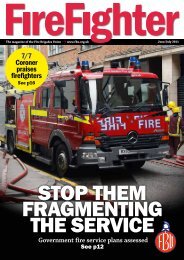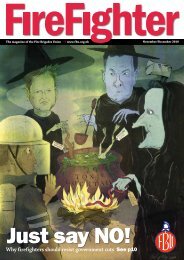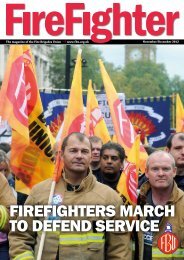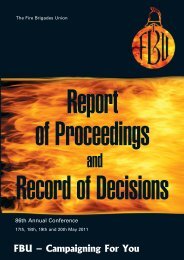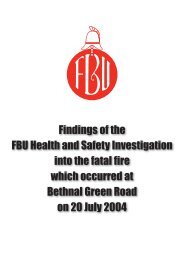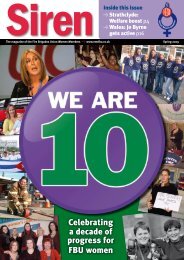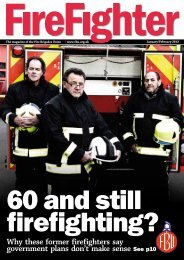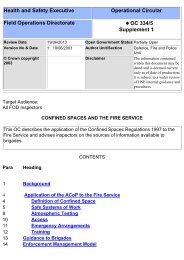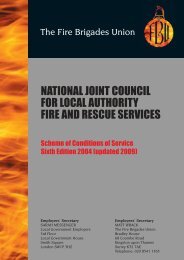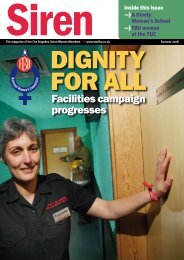Report - Fire Brigades Union
Report - Fire Brigades Union
Report - Fire Brigades Union
You also want an ePaper? Increase the reach of your titles
YUMPU automatically turns print PDFs into web optimized ePapers that Google loves.
SECTION B — FIRE AND RESCUE SERVICE POLICY<br />
●<br />
●<br />
That the FRS should ensure all fixed assets are<br />
included in wider strategic cross-service reviews to<br />
encourage greater rationalisation and reduction in<br />
duplication of assets with partners at a local level;<br />
The FRS should actively use the OGC Benchmarking<br />
Tool and establish some norms on building<br />
performance.<br />
12. WORKFORCE, SKILLS AND TRAINING<br />
The approach the Service takes to delivering a competent<br />
workforce is an increasingly important area. The<br />
engagement of Skills for Justice as the Sector Skills<br />
Council has been successful and continued collective<br />
funding of this is vital to the sector as a whole. The<br />
maintenance of occupational standards and the<br />
development of a qualification framework, specifically<br />
focusing on risk critical activities is vitally important. From<br />
an efficiency perspective the relationship with Skills for<br />
Justice has enabled the service to tap into additional<br />
funding and other development programmes. However,<br />
training capacity and resource is inefficiently deployed<br />
nationally and would benefit from better coordination and a<br />
national review could provide an appropriate driver for<br />
change. Large capital investment facilities such as real fire<br />
training units and other specialist training could be provided<br />
by the private sector. There is general consensus that how<br />
FRAs train locally, with neighbours and at the <strong>Fire</strong> Service<br />
College is not the optimal model from an efficiency<br />
perspective.<br />
13. RETAINED DUTY SYSTEM<br />
The retained duty system (RDS) already provides the FRS<br />
with a resource that is drawn directly from the<br />
communities it serves, exemplifying Big Society objectives,<br />
and which can provide a highly cost effective means of<br />
service delivery. The RDS model has significant potential,<br />
currently largely unused, for expansion including within an<br />
urban environment and in providing, for example, night<br />
time cover. To secure and expand the willingness of<br />
employers to allow their staff to participate, the Service<br />
must build stronger links with the business community<br />
both locally and collectively on a national basis.<br />
Where RDS stations work well they provide a very cost<br />
effective operational option; however, there are issues<br />
which need to be addressed in the Service’s reliance on<br />
RDS in some localities. Firstly staffing costs are rising due<br />
to changes nationally and also local moves to part time<br />
contracts. In some areas recruitment and retention is very<br />
volatile and maintenance of competence is an ongoing<br />
issue. Managerial overheads to support and sustain<br />
retained/part time staff have risen over recent years to<br />
address some of the issues listed above so overall the<br />
utility and economy that retained/part-time staffed stations<br />
provide is not as compelling as it once was for a number of<br />
FRAs.<br />
14. VOLUNTEERING<br />
Volunteering is already used in a number of FRAs to<br />
support and enhance the delivery of services. The <strong>Fire</strong> and<br />
Rescue Service as a whole is ideally placed to build on this,<br />
through its presence in fire stations in many communities,<br />
its highly regarded brand and its ability to broaden out what<br />
it does, depending on local choice. Volunteering has<br />
significant scope to improve the core <strong>Fire</strong> and Rescue<br />
Service offer, through functions such as after the fire<br />
support, translation, penetration of harder to influence<br />
groups and delivering community safety initiatives. Whilst<br />
there is a need to make a modest investment in<br />
developing and delivering volunteer schemes, the potential<br />
benefits are big and linking what FRAs do with the Big<br />
Society agenda on a more structured basis could help<br />
broaden and embed volunteering in the Service. Another<br />
aspect of this is the use of volunteers to undertake fire and<br />
rescue response work. There are many overseas examples<br />
of this and some UK experience too. Big Society may<br />
provide an opportunity to develop this further, however,<br />
there are significant risks attached to this which would<br />
need to be effectively managed.<br />
●<br />
●<br />
Volunteering in the FRS should be developed, further<br />
building on existing good practice;<br />
In the area of FRS response services, a model for<br />
changing emergency cover to a local community based<br />
voluntary run station accounted for within the IRMP<br />
should be developed.<br />
15. PAY AND CONDITIONS<br />
Since the paybill is the biggest single cost for all FRAs, this<br />
workstream has considered whether existing arrangements<br />
for determining pay and conditions are cost effective and<br />
flexible enough for the future challenges facing the Service.<br />
It was important to consider this in the context of three<br />
closely related issues: the process for negotiating and<br />
agreeing terms and conditions, the right balance between<br />
local and national determination, and the industrial relations<br />
climate in the FRS. The current model has a number of<br />
significant strengths but the alternative would be greater<br />
local negotiation with some or no central support.<br />
The consensus view from contributors to the <strong>Fire</strong> Futures<br />
review has been that change in the current mechanism<br />
would most appropriately be driven by change in the way<br />
FRAs function – i.e. if localism drives local change in the<br />
function of FRAs then this might argue for greater local<br />
determination of pay and conditions. The impact the<br />
constitutional changes have had raised the issue of<br />
separating out an English NJC, though the case for this<br />
change was not widely supported. Options therefore are<br />
that any change should reflect change in the way FRAs<br />
function and are:<br />
●<br />
●<br />
●<br />
●<br />
Retention of the current system broadly as it stands;<br />
Greater local flexibility within a continuing national<br />
framework;<br />
A system based on locally negotiated terms and<br />
conditions;<br />
Establishment of an England-only NJC.<br />
48 FBU Annual <strong>Report</strong> 2011





